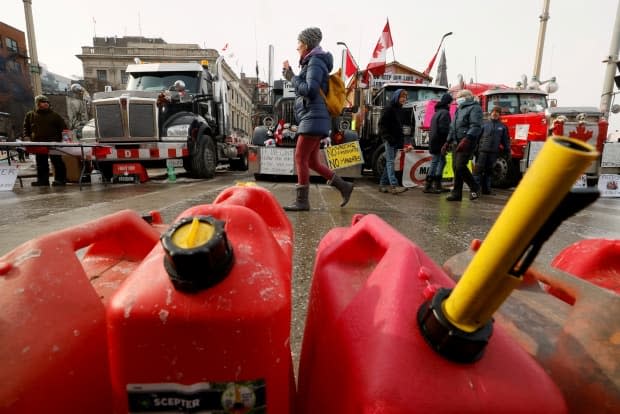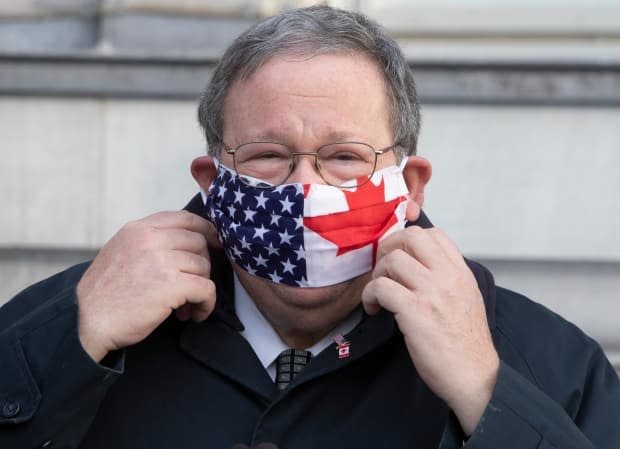How a former Trump official wound up at Ottawa's convoy protest

A former Trump administration official has been in Ottawa for days to participate in the protests against vaccine mandates and other COVID-19 measures in what he describes as a personal mission.
Paul Alexander is a Canadian former part-time faculty member at McMaster University in Hamilton who lives in the U.S. and had a contentious stint as science adviser to former president Donald Trump earlier in the pandemic.
Now, he's part of the demonstrations in Ottawa, holding news conferences, appearing alongside People's Party of Canada Leader Maxime Bernier and tweeting about bringing fuel to protesting truckers.
He said he's also been contacted, as the protest spreads abroad, by people hoping to organize a similar convoy across the United States.
Alexander told CBC News he'll participate in any event he can, anywhere, on either side of the border, as part of his mission to oppose existing pandemic policies.
"The truckers have common sense," Alexander said in a phone interview.
"It's going to be massive," he said of a possible U.S. truck protest, "and politicians had better pay attention."
He wants policy-makers in jail
While protest organizers say this isn't an anti-vaccine demonstration, Alexander makes clear he's deeply critical of the COVID-19 vaccines, especially for use on young, healthy people. He says he longs to see public officials who promoted COVID-19 vaccines and other pandemic policies imprisoned someday.
"I don't care who you are. You should sit in a jail," said Alexander. "One day, I wish, and I hope, that we re-examine this."
His opinion sits far outside the prevailing view of the health policy-making community that COVID-19 vaccines have saved lives by inoculating people against a virus that has killed 5.8 million people worldwide. It even contrasts with that of his former boss: Trump has urged supporters to get vaccinated and says he's received three doses himself.

One jurisdiction after another has credited COVID-19 vaccines with reducing hospitalizations and mortality. The latest numbers from New York state suggest unvaccinated people test positive at a rate almost nine times higher and are 15 times likelier to be hospitalized from COVID-19.
In Canada, since last October, more than 8,000 people have died and unvaccinated people suffered deaths and hospitalizations at a rate several times higher than those who were vaccinated.
Alexander made clear that he supports other vaccines: "I am not an anti-vaxxer. I am for vaccines. My kids are vaccinated. … It's [just] these vaccines," he said.
WATCH | Right-wing media and politicans voice support for convoy protests:
He's been professionally shunned
Alexander was among the political appointees in the Trump administration who clashed with colleagues over their starkly opposing views of the pandemic.
He says his life was upended as a result. He left the U.S. Department of Health and Human Services in 2020 after only a few months in the role. McMaster University, where he earned a PhD in health-research methods in 2015, has severed ties with him.
"It has been devastating," Alexander told CBC News.
He ascribes his shunning to his claims that vaccines don't work as well as advertised, that their long-term effects are unknown, that some people have been hurt by them, and that lockdowns were a catastrophe.
According to data from the Centers for Disease Control and Prevention, an extremely small percentage of vaccinations have coincided with fatalities.
He wanted to test herd immunity
Alexander and his Trump administration allies bickered with other officials over his push for a completely different strategy, involving so-called herd immunity. Alexander's preferred plan was to keep things open, let low-risk people get infected, try isolating high-risk people, and in cases of serious illness, prescribe cocktails of existing anti-viral drugs.
In an interview, he called himself a non-partisan and said he hopes to see Prime Minister Justin Trudeau's government succeed, though he used the prime minister's recent COVID-19 diagnosis to question the efficacy of vaccines.
"[Trudeau] is triple vaccinated and masked to his eyeballs," he said.
He said he won't stay much longer in Ottawa as he needs to get back to his home in Washington, D.C.
U.S. politicians now involved
Alexander's involvement with the pandemic-protest movement on both sides of the border illustrates the increasingly international nature of the convoy event.
Questions about it are becoming a daily occurrence at White House briefings, as protesters restrict traffic at the busiest Canada-U.S. border crossing.
WATCH | Protests hobble key U.S.-Canada border crossings:
The White House homeland-security adviser convened a meeting on it Wednesday. A spokesman for President Joe Biden said officials are in close contact with officials in Michigan, Canada and with industries that rely on the mostly blocked Windsor-Detroit Ambassador Bridge.
"We're very focused on this," said White House spokeswoman Jen Psaki.
"The president is focused on this."

Some parliamentarians want to call the U.S. ambassador to Canada to a committee to discuss American involvement in the protest convoy, which has received financial donations and promotional support from abroad.
And NDP MP Heather McPherson plans to introduce a motion that, if passed, would request that Ambassador David Cohen spend up to an hour with the committee.
Her motion also expressed concern about the fact that Americans in positions of authority have shown support for a protest whose organizers had previously said they wanted to force the resignation of the government of Canada if it didn't abolish vaccine mandates.

The political support in the U.S. includes several Republican-led state governments. Some are threatening investigations into a company that cancelled a protest fundraising campaign.
Texas, for example, has launched an investigation into GoFundMe for shutting down a fundraising campaign for the Ottawa protest. Texas Attorney General Ken Paxton sent the company a legal letter asking for 29 types of documents, including the company's communications with Canadian police and the U.S. and Canadian governments.
He also asked for documents to identify Texas donors who donated to the convoy, which would begin to address the unanswered question of how much funding for the protest came from abroad.
WATCH | Convoy protesters and critics far apart:


